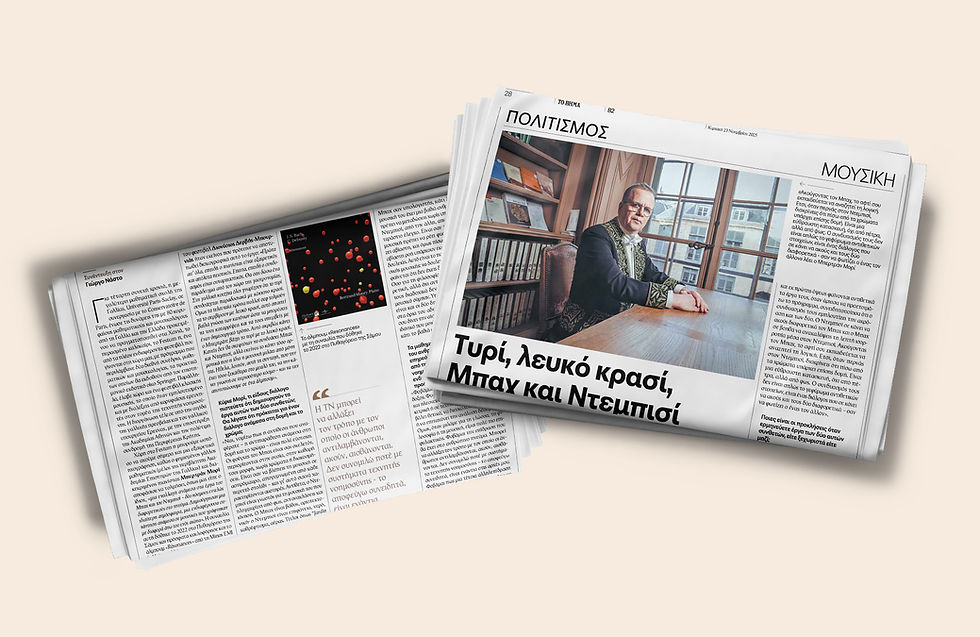Cédric Villani: "Europe needs cultural unity"
- Designature Community
.png/v1/fill/w_320,h_320/file.jpg)
- Aug 11, 2024
- 4 min read
Updated: Jun 3, 2025
Thank you to the newspaper "TA NEA" and Alexia Kefalas for this interview. Special thanks to Elsie Saratsie for the excellent translation from the original French.
Aegean, Capital of Mathematics and Music
Cédric Villani, Fields Medalist 2010,
President of the Committee for the Evaluation of Scientific and Technological Choices of the French Parliament, Member of Parliament
Dionysios Dervis-Bournias, Greek-French orchestra conductor
The arrival this week in Samos of Professor Bertrand Maury inaugurates the collaboration between Paris-Saclay University and the University of the Aegean.
A Greek-French collaboration in the field of mathematics, in the islands of the Aegean, is not a choice made lightly.
If the inhabitants of 21st-century cities consider the Aegean an archipelago of summer idleness, in ancient times its islands hosted the arduous intellectual pursuit of great scientists and mathematicians. If Greek philosophy first saw the light in Ephesus before developing in Athens and becoming the nurturer of Western thought, mathematics was cultivated and advanced by the Greeks on the islands of the Aegean.
Let us take a look at the primordial geography of the Aegean, less picturesque than a postcard beach, but bearing a different, more time-resistant imprint: in Rhodes, the first astronomical clocks were designed by the Rhodian Geminos, ancestors of our modern computers; in Chios, the Chian Oenopides conceived the obliquity of the zodiac. Finally, in Samos, in the early 6th century BC, the Samian Pythagoras formulated the principle of the supremacy of number, “Number is the essence of all things”, outlining the proportion between Number and Logos — a fundamental trait of scientific thought and, incidentally, the foundation of the digital revolution. Pythagoras was also the first to discover and study the close relationship between music and mathematics.
How can we assess this Aegean intellectual wealth, so deeply Greek, whose journey begins in antiquity? It is as if one were to retrace, one by one, the proofs of the Earth's sphericity — starting with Anaximander.
An excessive effort with uncertain outcome — since, according to Heraclitus, vast learning does not teach intelligence. In Samos, whose ties with France date back to the 19th century, we would like to establish a Center for Mathematics and Music. A European Center inspired by the Pythagorean spirit, on the island where Pythagoras first saw the light of day. Equidistant from the Middle East and Russia. Just a step away from Turkey. On the fault line where, since ancient times, East and West have clashed — sometimes in harmony, often in conflict. Karol Beffa, Katia and Marielle Labèque, Thierry Pécou — prominent figures of the French and international music scene — will join forces with mathematicians from the University of the Aegean and Paris-Saclay in the vision of reviving the Aegean of Pythagoras.
If in the 19th century war was "the continuation of politics by other means" (Clausewitz), that role now belongs to culture, which remains at once a means of reconciliation. Let us give it a chance.
*texte français de l’itw Cédric Villani dans les commentaires
Égée, capitale des mathématiques et de musique VERSION 24 AOUT pour TA NEA (journal
grec)
Cédric Villani, Médaille Fields 2010, Député de l'Essonne,
Président de l'Office parlementaire d'évaluation
des choix scientifiques et technologiques
Dionysios Dervis-Bournias, chef d’orchestre franco-grec
L’arrivée cette semaine du Professeur Bertrand Maury à Samos inaugure la collaboration de l’Université Paris-Saclay avec l’Université de l’Égée. Une collaboration franco-grecque dans le domaine des mathématiques sur les iles de la mer Égée n’est pas un choix anodin. Les urbains du 21 ème siècle considèrent l’Égée comme un archipel dédié au farniente. Pourtant, pendant l’Antiquité, ces mêmes iles abritaient des scientifiques et des mathématiciens en pleine activité. Si c’est à Éphèse que la philosophie grecque a d’abord vu le jour pour se déployer ensuite à Athènes avant de devenir tutrice de la pensée occidentale, c’est sur les iles de la mer Égée que les grecs ont développé les mathématiques. Observons l’originelle géographie de l’Égée, moins pittoresque qu’une plage de carte postale mais dont l’empreinte fut autrement plus résistante dans le temps : c’est bien à Rhodes que
furent dessinées les premières horloges astronomiques, ancêtres de nos ordinateurs, par Geminos de Rhodes ; c’est à Chios que l’obliquité du zodiaque fut découverte par Œnopide de Chios. C’est à Samos enfin que fut formulé au début du 6ème siècle avant notre ère «Tout est nombre» par Pythagore de Samos ; dessinant ainsi un rythme entre arithmos (nombre) et logos, caractéristique première de la pensée scientifique et accessoirement base de la révolution numérique. Et c’est ce même Pythagore qui étudiera pour la première fois en Occident le rapport étroit entre musique et mathématique.
Comment rendre compte de cette richesse intellectuelle égéenne intimement grecque depuis l’antiquité ? Autant reprendre une par une les preuves de la sphéricité de la terre et ce depuis Anaximandre ! C’est trop d’effort pour un résultat incertain puisque «la polymathie n’enseigne pas l’intelligence» selon Héraclite.
C’est sur Samos, dont les relations avec la France datent du 19 ème siècle que l’on aimerait édifier un centre européen des mathématiques et de la musique, projet pythagoricien sur l’ile où Pythagore a vu le jour. À équidistance du Moyen-Orient et de la Russie. À portée de voix de la Turquie. Sur la ligne de fracture où depuis l’Antiquité Occident et Orient se dévisagent, parfois s’unissent et si souvent se déchirent. Karol Beffa, Katia et Marielle Labèque, Thierry Pécou, figures de proue de la musique française sont prêts à se joindre aux mathématiciens des deux universités pour faire revivre l’Égée de Pythagore.
Si au 19 ème siècle la guerre fut «la continuation de la politique par d’autres moyens» (Clausewitz) ce rôle incombe dorénavant à la culture qui reste, en même temps, instrument de réconciliation. Donnons-lui une chance !




